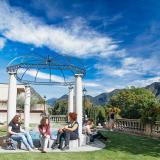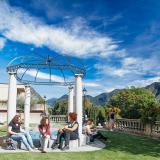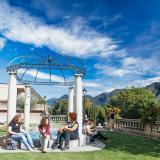| Course | Sec | Course Title | Faculty | Day | Time | ||
|---|---|---|---|---|---|---|---|
| ECN 101 | 1 | Principles of Microeconomics | Stack | MTWT | 8:30 - 11:05 | ||
|
Principles of Microeconomics This is an entry-level course in economics, covering fundamentals of microeconomics and aimed at students who choose it as an elective or plan to continue their studies in economics. This course helps students develop basic analytical skills in economics and microeconomics. It provides students with a basic understanding of the market system in advanced capitalist economies. It examines the logic of constrained choice with a focus on the economic behavior of individuals and organizations. After a theoretical analysis of the determinants and the interaction of supply and demand under competitive conditions, alternative market structures will be investigated, including monopolistic and oligopolistic forms. The course examines the conditions under which markets allocate resources efficiently and identifies causes of market failure and the appropriate government response. The introduction to the role of government includes its taxing and expenditure activities as well as regulatory policies.
|
|||||||
| ECN 297 | 1 | Financing Sustainable Development | Duroy | MTWT | 11:30 - 14:05 | ||
|
Financing Sustainable Development In its most basic definition, sustainable development is described as ?development which meets the needs of the present without compromising the ability of future generations to meet their own needs.? As countries around the world struggle to tackle the issues of climate disruption, water scarcity, resource exhaustion, population growth and socioeconomic conflicts, attention to methods of sustainable development is paramount, and financing those methods is increasingly important. In this context we posit the question: Is it possible for the current system of financial markets to facilitate the shift from an unsustainable world fueled by fossil hydrocarbons to a more desirable one powered by renewable energy? This course will examine how financial and capital markets operate on a transnational scale; and investigate the type of international governance over markets that would be needed to potentially produce fair and sustainable outcomes. The course will also examine the role individuals must perform as World Citizens motivated by a sense of responsibility towards the well-being of others beyond national boundaries.
|
|||||||
| ITA 101 | 1 | Introductory Italian, Part II | Kugler Bertola | MTWT | 11:30 - 14:05 | ||
|
Introductory Italian, Part II ITA 101 employs immersive experiential learning pedagogy, providing an introduction to the essentials of Italian grammar, vocabulary, and culture. This course is designed for students who have completed one semester of Italian language study. The course provides an introduction to the essentials of Italian grammar, vocabulary, and culture. The acquisition of aural/oral communication skills will be stressed and, as such, the predominant language of instruction will be Italian. By the end of the course students will achieve proficiency at the A2 level of the Common European Framework of Reference for Languages. Students will be expected to be proficient in the written and spoken usage of basic linguistic structures. Students will be expected to read and comprehend short passages in Italian and to draft simple compositions / dialogues. Project-based assignments will be designed to foster practical communication skills and encourage efforts towards increased student integration in the local Italian-speaking community. Whenever possible, students will be encouraged to participate actively in local initiatives, festivals, events and to apply the skills they are mastering in class to their co-curricular learning on and off campus.
|
|||||||
| ITA 202 | 1 | Immersive Intermediate Italian | To be Announced (TBA) | MTWT | 10:00 - 15:30 | ||
|
Immersive Intermediate Italian Language This is a full immersion course that covers the material of ITA 200 and ITA 201 in four weeks, and prepares students for advanced language and literature study. Students will be expected to sign a pledge to use only Italian in and outside of the classroom. Students will develop the intermediate language competences in the four skills of listening, speaking, reading, and writing, while discussing and exploring cultural and social issues of Italy and Ticino. Upon successful completion of the course, students will reach the B1/B2 level of the European Common Framework of Reference for Languages.
|
|||||||
| POL 101 | 1 | Introduction to International Relations | Filic | MTWT | 8:30 - 11:05 | ||
|
Introduction to International Relations This course provides the basic analytic tools necessary for the understanding of international relations. After a brief introduction to the realist and liberal approaches to the study of international relations, the course covers various fundamental concepts, such as national power, foreign policy, conflict, political economy, international trade, and international organizations.
|
|||||||
| POL 176 | 1 | International Environmental Politics | Zanecchia | MTWT | 11:30 - 14:05 | ||
|
International Environmental Politics (This course must be taken in conjunction with POL 281T) It has become increasingly apparent in recent years that environmental problems have been proliferating and nation-states are not able to cope with them individually. International cooperation is essential to finding and applying solutions. This course will first examine the origins of the main environmental problems affecting nations, such as climate change, the greenhouse effect, acid rain, desertification, pollution, disposal of radioactive and chemical waste material, trade in endangered species, etc. Students will investigate the environmental problems connected to trade globalization and the question of sustainable development, and will study how states have tried to deal with these problems through the role of international organizations such as the UN and the EU and non-governmental organizations such as Greenpeace, WWF, etc. The effectiveness of international treaties such as the Kyoto Protocol and CITES, and the problems in their application, will also be examined.
|
|||||||
| POL 281T | 1 | Politics of Sust & Development (Africa) | Zanecchia | M-F | 14:30 - 17:05 | ||
|
Politics of Sustainability and Development (Africa) (This course must be taken in conjunction with POL 176/376) This interdisciplinary course explores the politics and practice of sustainable development in the industrial North and developing South. Through a series of problem-based case studies, students will explore the political, social, economic, environmental, and cultural relationships that encompass the important field of sustainable development. Students will come to better understand how developed, as well as lesser developed countries, approach sustainability and natural resource management. Student research projects will include team-based analyses of the politics of sustainable agriculture, renewable energy, climate change, biodiversity, and sustainable design within the broader context of global environmental issues such as deforestation, desertification, habitat degradation, and conventional models of development. (Africa: Botswana) NOTE: This Academic Travel course carries a supplemental fee: CHF 1,600 / USD 2,100.
|
|||||||
| POL 376 | 1 | International Environmental Politics | Zanecchia | MTWT | 11:30 - 14:05 | ||
|
International Environmental Politics (This course must be taken in conjunction with POL 281T) It has become increasingly apparent in recent years that environmental problems have been proliferating and nation-states are not able to cope with them individually. International cooperation is essential to finding and applying solutions. This course will first examine the nature and the sources of the main environmental problems affecting the lives of nations, such as climate change and its effects, including the ozone layer and the greenhouse effect, acid rain, desertification, pollution, disposal of radioactive and chemical waste material, etc. Students will investigate the environmental problems connected to trade globalization and the question of sustainable development and will study how states have tried to deal with these problems and the role of international organizations such as the UN and the EU and non-governmental organizations such as Greenpeace, etc. The effectiveness of international treaties such as the Kyoto Protocol and the problems in their application will also be examined.
|
|||||||
| REL 296 | 1 | Three Faiths, One God: Judaism, Christia | Novikoff | MTWT | 11:30 - 14:05 | ||
|
Three Faiths, One God: Judaism, Christianity, and Islam The three most influential religions of the world all originated within a small geographical area that we now call the Middle East. To many it is the Holy Land; to others still it is the root of modern wars. This course surveys the rise and historical development of Judaism, Christianity, and Islam from their modest beginnings to their global influence, with particular emphasis on the historical and intellectual forces that made these growths possible. Readings in primary and secondary sources will consider the ancient kingdom of Judaea, the Jewish origins of Christianity, the philosophies of medieval Christianity and Islam, the earliest conflicts between Christianity and Islam (including the Crusades), and the search for religious identity in a globalized and pluralistic modern world.
|
|||||||
Summer Programs Undergraduate Courses



